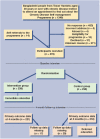Randomised controlled trial of a lay-led self-management programme for Bangladeshi patients with chronic disease
- PMID: 16281998
- PMCID: PMC1570787
Randomised controlled trial of a lay-led self-management programme for Bangladeshi patients with chronic disease
Abstract
Background: Reducing the impact of chronic disease in minority ethnic groups is an important public health challenge. Lay-led education may overcome cultural and language barriers that limit the effectiveness of professionally-led programmes. We report the first randomised trial of a lay-led self-management programme - the Chronic Disease Self-Management Programme (CDSMP) (Expert Patient Programme) - in a south Asian group.
Aim: To determine the effectiveness of a culturally-adapted lay-led self-management programme for Bangladeshi adults with chronic disease.
Design of study: Randomised controlled trial.
Setting: Tower Hamlets, east London.
Method: We recruited Bangladeshi adults with diabetes, cardiovascular disease, respiratory disease or arthritis from general practices and randomised them to the CDSMP or waiting-list control. Self-efficacy (primary outcome), self-management behaviour, communication with clinician, depression scores, and healthcare use were assessed by blinded interviewer-administered questionnaires in Sylheti before randomisation and 4 months later.
Results: Of the 1363 people invited, 476 (34%) agreed to take part and 92% (439/476) of participants were followed up. The programme improved self-efficacy (difference: 0.67, 95% confidence interval [CI] = 0.08 to 1.25) and self-management behaviour (0.53; 95% CI = 0.01 to 1.06). In the 51% (121/238) of intervention participants attending three or more of the 6-weekly education sessions the programme led to greater improvements in self-efficacy (1.47; 95% CI = 0.50 to 1.82) and self-management behaviour (1.16; 95% CI = 0.50 to 1.82), and reduced HADS depression scores (0.64; 95% CI = 0.07 to 1.22). Communication and healthcare use were not significantly different between groups. The programme cost pound123 (181) per participant.
Conclusion: A culturally-adapted CDSMP improves self-efficacy and self-care behaviour in Bangladeshi patients with chronic disease. Effects on health status were marginal. Benefits were limited by moderate uptake and attendance.
Figures
References
-
- Gill P, Kai J, Bhopal R, Wild S. Health care needs assessment of black and minority ethnic groups. NHS health needs assessment, the fourth series of epidemiologically based reviews. Oxford: Radclliffe medical Press; 2003.
-
- Riste L, Khan F, Cruickshank K. High Prevalence of Type 2 diabetes in all ethnic groups, including Europeans, in a British inner city: Relative poverty, history, inactivity, or 21st century Europe? Diabetes Care. 2001;24(8):1377–1383. - PubMed
-
- Gilthorpe MS, Lay-Yee R, Wilson RC, et al. Variations in hospitalization rates for asthma among black and minority ethnic communities. Respir Med. 1998;92(4):642–648. - PubMed
-
- Department of Health. Tackling health inequalities. London: HMSO; 2003.
Publication types
MeSH terms
LinkOut - more resources
Full Text Sources
Medical
Research Materials

